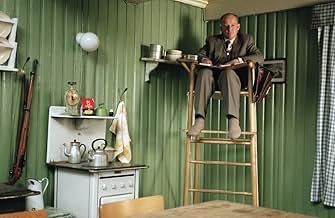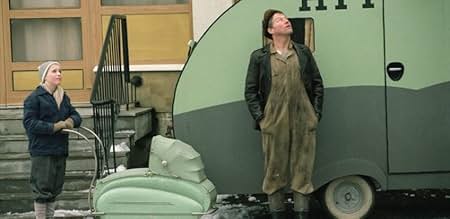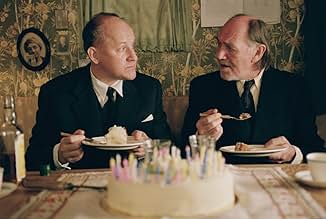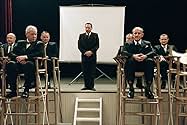IMDb-BEWERTUNG
7,3/10
8798
IHRE BEWERTUNG
Füge eine Handlung in deiner Sprache hinzuA scientific observer's job of observing an old cantankerous single man's kitchen habits is complicated by his growing friendship with him.A scientific observer's job of observing an old cantankerous single man's kitchen habits is complicated by his growing friendship with him.A scientific observer's job of observing an old cantankerous single man's kitchen habits is complicated by his growing friendship with him.
- Regie
- Drehbuch
- Hauptbesetzung
- Auszeichnungen
- 8 Gewinne & 7 Nominierungen insgesamt
Gard B. Eidsvold
- Bakkerman
- (as Gard Eidsvold)
Empfohlene Bewertungen
How do you make a film
no SELL the idea of a film, whose premise is the following? Take 1950 era Swedish scientists, whose goal is to find men who live alone in the wilderness and study their kitchen habits' at home for the purpose of building a more efficient living space for people. I am sure if any writer walking into Hollywood with that script would be instantly flogged before he even set foot in a studio executive boardroom. A story like this obviously seems to set itself up as a comedy, since the story is so obviously absurd, but what viewers come out with after witnessing this film is the great appreciation and the bonds the characters create. This is a truly touching masterful picture, from a premise that has the most bizarre source that I don't know how anyone could have even come up with. That premise is quite something, since it seems that the idea of studying male behavior in a kitchen in the backwoods of Norway is either going to be a complete disaster or something extremely memorable. Luckily it is the latter of the two. Isak Bjornsson is a scientist out to study a subject' named Folke who lives by himself and has literally no friends. Folke unwittingly is part of this experiment which involves Isak sitting in a giant chair overlooking his living space, as if he was the judge in a tennis match. Also Isak is supposed to follow certain rules set out by his employer. He is not to disturb Folke's living space, nor talk to him. If this isn't a unique bit of Scandinavian humor I don't know what is. If this film were to fall flat or even be just a short funny comedy, it would only fixate on the stupidity of this premise. Somehow a guy who sits in a log cabin miles away from civilization, who can put up with a stuffy repressed scientist whose main purpose is to write excruciating details of a man who literally spends his day doing nothing, is actually quite a funny situation for comedy. Kitchen Stories does not fail in that sense, but the ingeniousness is that Kitchen Stories is smarter than that.
The film suddenly takes the viewer to ask what the real purpose of these 2 men in the movie are and the focus provides and glaring and obvious point. They are essentially both alone in their lives for different reasons and they in a way need each other. But not of course in the sense of a dying love, but in a great sense of male camaraderie and caring that is essential to the idea of a great friendship
Gradually, the bond between scientist and subject breaks down, and both men start evolving a strange set of rules and create a friendship that comes off as the most genuine and heartwarming I've seen on screen since this year started.
As this relationship and some good subplots develop, the comedy takes another turn as Isak tries to hide from his boss ( a man who only dreams' of what the future possibilities of kitchens may look like), that he has engaged his subject in what is obviously, caring' humanity. The nerve!
I loved this film from the moment it started till its tender conclusion. It had only a short run in my area, and even after what must have been several months since I've seen it, I still think about it and a giant smile comes across my face.
It is touching, heartwarming, very funny, and just flat out great. It is the best film I have seen so far this year. If you ever get a chance to see it, go immediately. It shows the perfect beauty of the bond between us all as people, in the most kooky, unique bizarre way. And that in itself is pure genius
Rating 10 out of 10
The film suddenly takes the viewer to ask what the real purpose of these 2 men in the movie are and the focus provides and glaring and obvious point. They are essentially both alone in their lives for different reasons and they in a way need each other. But not of course in the sense of a dying love, but in a great sense of male camaraderie and caring that is essential to the idea of a great friendship
Gradually, the bond between scientist and subject breaks down, and both men start evolving a strange set of rules and create a friendship that comes off as the most genuine and heartwarming I've seen on screen since this year started.
As this relationship and some good subplots develop, the comedy takes another turn as Isak tries to hide from his boss ( a man who only dreams' of what the future possibilities of kitchens may look like), that he has engaged his subject in what is obviously, caring' humanity. The nerve!
I loved this film from the moment it started till its tender conclusion. It had only a short run in my area, and even after what must have been several months since I've seen it, I still think about it and a giant smile comes across my face.
It is touching, heartwarming, very funny, and just flat out great. It is the best film I have seen so far this year. If you ever get a chance to see it, go immediately. It shows the perfect beauty of the bond between us all as people, in the most kooky, unique bizarre way. And that in itself is pure genius
Rating 10 out of 10
Having just seen Kaurismaki's dryly-witty `Man Without a Past,' I couldn't believe that director Bent Hamer's `Kitchen Stories' is actually drier and funnier. The Norse/Swedish co-production depicts 1950's Swedes studying bachelors in their kitchens to improve their lives. Swedish scientist Folke, in a high chair like some infantile god, observes Norwegian Isak under the restriction that he must not interact with Isak.
The humor comes from the stereotypical Swede as uptight and organized and the Norwegian as slow but solid. The silliness of the experiment itself is obvious and the restriction ludicrous because of course they will interact, in fact bond, given the loneliness of Norway's winter and the need for humans to be sociable. That the story turns on male bonding is a bonus, especially because neither country is considered a bastion of sociability. When Isak lets Folke listen to the radio on his teeth fillings, I figure the guys are in for some warm nights.
In another way, this film could be as good as it gets for analyzing the effect observers have on their subjects, be it laboratory or media. A question probably unanswerable even today is how much anyone changes under observation. In the case of the central characters in `Kitchen Stories,' the change is considerable, but more so just because of another human being's presence in an otherwise lonely world. The credibility of documentaries and scientists is on the table here.
The minimal dialogue and occasional joke, spiced with subtle racial stereotyping, makes me think of not only Kaurismaki but also Beckett, whose waiting characters sometime talk nonsense, but most of the time profundity under the guise of simplicity. `Kitchen' is a slow but rewarding film that strips life of its pretensions to study more closely the tissue that binds humanity with communication.
Diplomat Dag Hammarskjold in his Markings caught the minimalism of this film: `Friendship needs no words-it is solitude delivered from the anguish of loneliness.'
The humor comes from the stereotypical Swede as uptight and organized and the Norwegian as slow but solid. The silliness of the experiment itself is obvious and the restriction ludicrous because of course they will interact, in fact bond, given the loneliness of Norway's winter and the need for humans to be sociable. That the story turns on male bonding is a bonus, especially because neither country is considered a bastion of sociability. When Isak lets Folke listen to the radio on his teeth fillings, I figure the guys are in for some warm nights.
In another way, this film could be as good as it gets for analyzing the effect observers have on their subjects, be it laboratory or media. A question probably unanswerable even today is how much anyone changes under observation. In the case of the central characters in `Kitchen Stories,' the change is considerable, but more so just because of another human being's presence in an otherwise lonely world. The credibility of documentaries and scientists is on the table here.
The minimal dialogue and occasional joke, spiced with subtle racial stereotyping, makes me think of not only Kaurismaki but also Beckett, whose waiting characters sometime talk nonsense, but most of the time profundity under the guise of simplicity. `Kitchen' is a slow but rewarding film that strips life of its pretensions to study more closely the tissue that binds humanity with communication.
Diplomat Dag Hammarskjold in his Markings caught the minimalism of this film: `Friendship needs no words-it is solitude delivered from the anguish of loneliness.'
The summary of Salmer fra kjokkenet in imdb places the movie in the "feel good" genre. This may be true for UK citizens, however a swede really gets the shivers alongside with incontrollable laughs while watching this movie.
The horror derives from the fact that since the thirties the Swedish politicians seriously have believed that they were able to shape society with reason and logic. Thus in the movie, there is the "Institute of private homes research", the object being to develop the most logically structured kitchen, adapted to the average movements of the "normal" house wife.
This excellent movie made in Norway, the neighbouring country of Sweden - which up to 1905 was submitted in a state union with Sweden - makes a very convincing statement about the "swedish mentality", that is how our welfare state has developed during the past 70 years.
The growing relationship between the aging Norwegian farmer and the archetypical swedish bureaucrat Nilsson. Nilssons job is to observe his delinquent while he is performing the daily chores in the country kitchen, is moving and, I think, quite significant if you're interested in the nature of mankind - one of Nilssons colleagues comes at him with the a priceless line of speach: "How the f**k can one know anything about ones fellow man, if not speaking to him?" It needs to be said - the obeservators are strongly advised not to interfere with their "objects of research".
In other words; at one level of Salmer fra kjokkenet provides you with great laughs, if you recognize the type who's main interest is to grasp control of your behavior, of your life. At another level this is a painful, yes, raw settlement with the swedish "social engineering" so admired by foreigners, at least in the past.
I cannot think of any other movie more worth recommending to somebody who's interested in what mankind really is, and what caricature she can made into.
This is a movie about how to make friends when every other possibility is exhausted, how to talk man to man, when every way of communication i banned by the "authorities".
The horror derives from the fact that since the thirties the Swedish politicians seriously have believed that they were able to shape society with reason and logic. Thus in the movie, there is the "Institute of private homes research", the object being to develop the most logically structured kitchen, adapted to the average movements of the "normal" house wife.
This excellent movie made in Norway, the neighbouring country of Sweden - which up to 1905 was submitted in a state union with Sweden - makes a very convincing statement about the "swedish mentality", that is how our welfare state has developed during the past 70 years.
The growing relationship between the aging Norwegian farmer and the archetypical swedish bureaucrat Nilsson. Nilssons job is to observe his delinquent while he is performing the daily chores in the country kitchen, is moving and, I think, quite significant if you're interested in the nature of mankind - one of Nilssons colleagues comes at him with the a priceless line of speach: "How the f**k can one know anything about ones fellow man, if not speaking to him?" It needs to be said - the obeservators are strongly advised not to interfere with their "objects of research".
In other words; at one level of Salmer fra kjokkenet provides you with great laughs, if you recognize the type who's main interest is to grasp control of your behavior, of your life. At another level this is a painful, yes, raw settlement with the swedish "social engineering" so admired by foreigners, at least in the past.
I cannot think of any other movie more worth recommending to somebody who's interested in what mankind really is, and what caricature she can made into.
This is a movie about how to make friends when every other possibility is exhausted, how to talk man to man, when every way of communication i banned by the "authorities".
The title may not be alluring. In fact, "Kitchen Stories" could be misleading to some that it'd be more of a women movie. Far from it - though it all may have started with the 'dazzling' multi-tetrahedrons of a chart that the self-satisfied scientist boasts of demonstrating findings on women's activity traffic in a kitchen. The snappy music sets me quite at ease in spite of anticipating reading subtitles - the melodic and light drum beats, chorus behind main vocal, sax/trumpet/trombone sounds - it's easy swinging tunes, indeed. The official site from filmsdulosange.fr gives you a feel of the 50's and a sampling of the jingle-like jazzy tune.
"Kitchen Stories" is an absolutely delightful piece. It's about a meticulously organized scientific research in the '50's on studying the kitchen behavior of single Norwegian men by assigned researchers from Sweden, in the name of advancement, of course - to improve kitchen activity efficiency. Sounds awfully dry? How can watching two men watching each other be interesting? Ah, to the genius of director Bent Hamer, who co-wrote and co-produced with Jörgen Bergmark, the film is simple enjoyment and relaxing fun. It's the discerning humor of observing human behavior of all parties involved: neighbor and neighborhood doctor, researcher and target subject, boss man and his boss - it's a film to relish and bemused upon.
Having had graphic arts, any pattern catches my eye. The opening scene - the caravan of the nine trailers each with an interesting form seen at the top of the trailer presented quite an engaging sight. Towards the end, one would realize - ah, it's that indispensable high umpire chair! Truly a well-made film and down to earth charming in all its naturalness - yes, engaging even with all the 'silent,' 'quiet,' 'observing' scenes - within and without the house.
It's also intriguing: what's happening elsewhere/upstairs while Folke Nilsson sat so quietly alone in the dark in that kitchen observation station of Isak's; what's Isak's thinking while he's piping; Grant the neighbor, what's he up to watching without a word in the cold darkness. And in the name of science, we are given insights to the 'body electric' static radio tuning.what am I talking about? Ha, that's another smilingly amusing reason to enjoy "Kitchen Stories." Thanks to the subtitles by Nick Norris, we get steady doses of chuckle and bemusing smiles throughout the film. The two main leads, Joachim Calmeyer as Isak and Tomas Norström as Folke, are fantastically 'wry' in their own self-bemused way, complementing each other's performance.
Not everything's indoors per se, there are impressive snowy landscapes, light of dawn and dead of night scenes by cinematographer Philip Øgaard. There's also a touching side story revolves around a faithful companion of a horse, and an anticipated red horse. It's full of little sprinkles of surprises and details, down to the specific food that Folke likes. Do enjoy this film. Bemused is the word repeatedly reinforced.
"Kitchen Stories" is an absolutely delightful piece. It's about a meticulously organized scientific research in the '50's on studying the kitchen behavior of single Norwegian men by assigned researchers from Sweden, in the name of advancement, of course - to improve kitchen activity efficiency. Sounds awfully dry? How can watching two men watching each other be interesting? Ah, to the genius of director Bent Hamer, who co-wrote and co-produced with Jörgen Bergmark, the film is simple enjoyment and relaxing fun. It's the discerning humor of observing human behavior of all parties involved: neighbor and neighborhood doctor, researcher and target subject, boss man and his boss - it's a film to relish and bemused upon.
Having had graphic arts, any pattern catches my eye. The opening scene - the caravan of the nine trailers each with an interesting form seen at the top of the trailer presented quite an engaging sight. Towards the end, one would realize - ah, it's that indispensable high umpire chair! Truly a well-made film and down to earth charming in all its naturalness - yes, engaging even with all the 'silent,' 'quiet,' 'observing' scenes - within and without the house.
It's also intriguing: what's happening elsewhere/upstairs while Folke Nilsson sat so quietly alone in the dark in that kitchen observation station of Isak's; what's Isak's thinking while he's piping; Grant the neighbor, what's he up to watching without a word in the cold darkness. And in the name of science, we are given insights to the 'body electric' static radio tuning.what am I talking about? Ha, that's another smilingly amusing reason to enjoy "Kitchen Stories." Thanks to the subtitles by Nick Norris, we get steady doses of chuckle and bemusing smiles throughout the film. The two main leads, Joachim Calmeyer as Isak and Tomas Norström as Folke, are fantastically 'wry' in their own self-bemused way, complementing each other's performance.
Not everything's indoors per se, there are impressive snowy landscapes, light of dawn and dead of night scenes by cinematographer Philip Øgaard. There's also a touching side story revolves around a faithful companion of a horse, and an anticipated red horse. It's full of little sprinkles of surprises and details, down to the specific food that Folke likes. Do enjoy this film. Bemused is the word repeatedly reinforced.
This movie pokes fun, in a very gentle way, at a whole lot of things. At the Swedes and their "Ikea-type" market research, at the Norwegians and their laconic ways, and at the strange ways of humans altogether. This movie manages to be moving without being sentimental or manipulative. What I mean here is that the element of manipulation that is quite obvious in many of the more sophisticated recent "feel good" movies I generally enjoy (you know the ones I mean - Cinema Paradiso, Billy Elliot etc.) is not in evidence here. We are getting at something pretty basic and human with "Kitchen Stories". The movie tracks the unlikely relationship that develops between the Swedish market researcher, sent to observe (and strictly forbidden to interact with the subject of his study) the kitchen ways of his crusty Norwegian bachelor "host". Sounds rather minimal but this is a movie that is as good as a movie can get. Perfect pacing, perfect acting, perfect camera work, perfect story. While the movie can be enjoyed on the tv, as video, I think that it is best seen on a larger screen in a movie theater because the visual impact is strong. You come out of this movie a happier person than went in and that is worth something these days !
Wusstest du schon
- WissenswertesAt the beginning of the film, Malmberg (a Swede) becomes ill after having to drive on the right side of the road in Norway. Today both countries drive on the right. In 1967, Sweden switched to the right because making two versions of cars like Volvos and Saabs for domestic and foreign sales was inefficient. Also, there are many unguarded, unmarked border crossings points (unlike the crossing in the film); people would not realize which country they were in and sometimes ended up driving on the wrong side.
- VerbindungenSpoofed in Brødrene Dal og mysteriet med Karl XIIs gamasjer: Folge #1.1 (2005)
- SoundtracksVisa Från Utanmyra
Performed by Jan Johansson
Top-Auswahl
Melde dich zum Bewerten an und greife auf die Watchlist für personalisierte Empfehlungen zu.
- How long is Kitchen Stories?Powered by Alexa
Details
Box Office
- Bruttoertrag in den USA und Kanada
- 351.235 $
- Eröffnungswochenende in den USA und in Kanada
- 48.103 $
- 22. Feb. 2004
- Weltweiter Bruttoertrag
- 2.823.472 $
- Laufzeit
- 1 Std. 35 Min.(95 min)
- Farbe
- Sound-Mix
- Seitenverhältnis
- 1.85 : 1
Zu dieser Seite beitragen
Bearbeitung vorschlagen oder fehlenden Inhalt hinzufügen
















